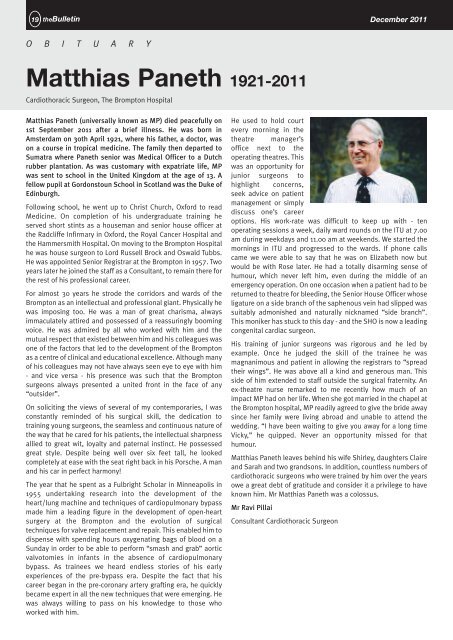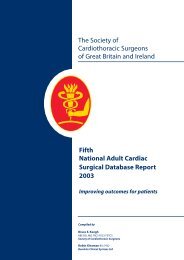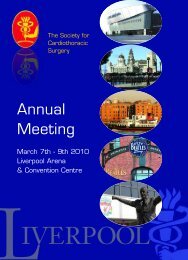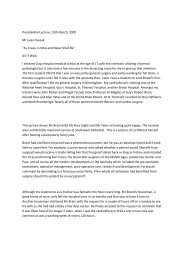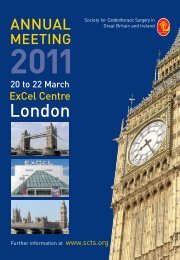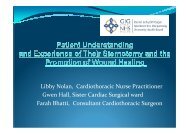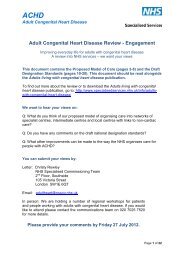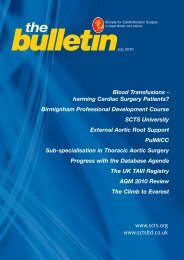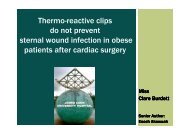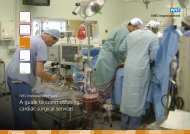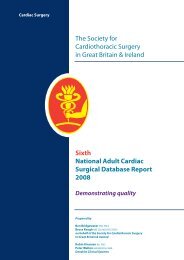Download - Society for Cardiothoracic Surgery
Download - Society for Cardiothoracic Surgery
Download - Society for Cardiothoracic Surgery
You also want an ePaper? Increase the reach of your titles
YUMPU automatically turns print PDFs into web optimized ePapers that Google loves.
19 theBulletin<br />
December 2011<br />
O B I T U A R Y<br />
Matthias Paneth 1921-2011<br />
<strong>Cardiothoracic</strong> Surgeon, The Brompton Hospital<br />
Matthias Paneth (universally known as MP) died peacefully on<br />
1st September 2011 after a brief illness. He was born in<br />
Amsterdam on 30th April 1921, where his father, a doctor, was<br />
on a course in tropical medicine. The family then departed to<br />
Sumatra where Paneth senior was Medical Officer to a Dutch<br />
rubber plantation. As was customary with expatriate life, MP<br />
was sent to school in the United Kingdom at the age of 13. A<br />
fellow pupil at Gordonstoun School in Scotland was the Duke of<br />
Edinburgh.<br />
Following school, he went up to Christ Church, Ox<strong>for</strong>d to read<br />
Medicine. On completion of his undergraduate training he<br />
served short stints as a houseman and senior house officer at<br />
the Radcliffe Infirmary in Ox<strong>for</strong>d, the Royal Cancer Hospital and<br />
the Hammersmith Hospital. On moving to the Brompton Hospital<br />
he was house surgeon to Lord Russell Brock and Oswald Tubbs.<br />
He was appointed Senior Registrar at the Brompton in 1957. Two<br />
years later he joined the staff as a Consultant, to remain there <strong>for</strong><br />
the rest of his professional career.<br />
For almost 30 years he strode the corridors and wards of the<br />
Brompton as an intellectual and professional giant. Physically he<br />
was imposing too. He was a man of great charisma, always<br />
immaculately attired and possessed of a reassuringly booming<br />
voice. He was admired by all who worked with him and the<br />
mutual respect that existed between him and his colleagues was<br />
one of the factors that led to the development of the Brompton<br />
as a centre of clinical and educational excellence. Although many<br />
of his colleagues may not have always seen eye to eye with him<br />
- and vice versa - his presence was such that the Brompton<br />
surgeons always presented a united front in the face of any<br />
“outsider”.<br />
On soliciting the views of several of my contemporaries, I was<br />
constantly reminded of his surgical skill, the dedication to<br />
training young surgeons, the seamless and continuous nature of<br />
the way that he cared <strong>for</strong> his patients, the intellectual sharpness<br />
allied to great wit, loyalty and paternal instinct. He possessed<br />
great style. Despite being well over six feet tall, he looked<br />
completely at ease with the seat right back in his Porsche. A man<br />
and his car in perfect harmony!<br />
The year that he spent as a Fulbright Scholar in Minneapolis in<br />
1955 undertaking research into the development of the<br />
heart/lung machine and techniques of cardiopulmonary bypass<br />
made him a leading figure in the development of open-heart<br />
surgery at the Brompton and the evolution of surgical<br />
techniques <strong>for</strong> valve replacement and repair. This enabled him to<br />
dispense with spending hours oxygenating bags of blood on a<br />
Sunday in order to be able to per<strong>for</strong>m “smash and grab” aortic<br />
valvotomies in infants in the absence of cardiopulmonary<br />
bypass. As trainees we heard endless stories of his early<br />
experiences of the pre-bypass era. Despite the fact that his<br />
career began in the pre-coronary artery grafting era, he quickly<br />
became expert in all the new techniques that were emerging. He<br />
was always willing to pass on his knowledge to those who<br />
worked with him.<br />
He used to hold court<br />
every morning in the<br />
theatre manager’s<br />
office next to the<br />
operating theatres. This<br />
was an opportunity <strong>for</strong><br />
junior surgeons to<br />
highlight concerns,<br />
seek advice on patient<br />
management or simply<br />
discuss one’s career<br />
options. His work-rate was difficult to keep up with - ten<br />
operating sessions a week, daily ward rounds on the ITU at 7.00<br />
am during weekdays and 11.00 am at weekends. We started the<br />
mornings in ITU and progressed to the wards. If phone calls<br />
came we were able to say that he was on Elizabeth now but<br />
would be with Rose later. He had a totally disarming sense of<br />
humour, which never left him, even during the middle of an<br />
emergency operation. On one occasion when a patient had to be<br />
returned to theatre <strong>for</strong> bleeding, the Senior House Officer whose<br />
ligature on a side branch of the saphenous vein had slipped was<br />
suitably admonished and naturally nicknamed “side branch”.<br />
This moniker has stuck to this day - and the SHO is now a leading<br />
congenital cardiac surgeon.<br />
His training of junior surgeons was rigorous and he led by<br />
example. Once he judged the skill of the trainee he was<br />
magnanimous and patient in allowing the registrars to “spread<br />
their wings”. He was above all a kind and generous man. This<br />
side of him extended to staff outside the surgical fraternity. An<br />
ex-theatre nurse remarked to me recently how much of an<br />
impact MP had on her life. When she got married in the chapel at<br />
the Brompton hospital, MP readily agreed to give the bride away<br />
since her family were living abroad and unable to attend the<br />
wedding. “I have been waiting to give you away <strong>for</strong> a long time<br />
Vicky,” he quipped. Never an opportunity missed <strong>for</strong> that<br />
humour.<br />
Matthias Paneth leaves behind his wife Shirley, daughters Claire<br />
and Sarah and two grandsons. In addition, countless numbers of<br />
cardiothoracic surgeons who were trained by him over the years<br />
owe a great debt of gratitude and consider it a privilege to have<br />
known him. Mr Matthias Paneth was a colossus.<br />
Mr Ravi Pillai<br />
Consultant <strong>Cardiothoracic</strong> Surgeon


